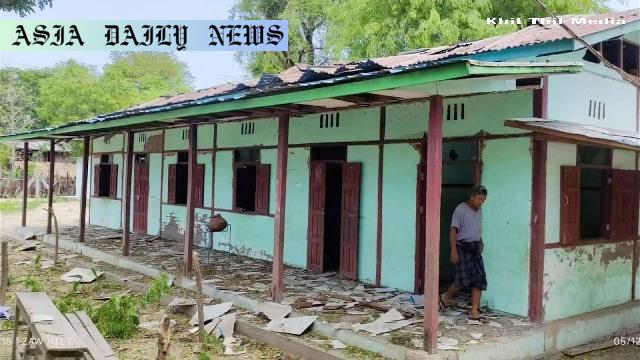Myanmar airstrike: At least 20 children and two teachers were killed in a bombing on a school operated by pro-democracy forces.
- Myanmar airstrike targeted a pro-democracy-run school in Sagaing.
- At least 22 people, including 20 children, were killed in the attack.
- Over 50 people were injured, and the casualty toll may rise as people remain missing.
- The military denies responsibility, calling reports ‘false news.’
- The incident reflects ongoing tension since Myanmar’s military coup four years ago.

Myanmar Airstrike Causes Deadly Casualties in Sagaing School
Myanmar’s military launched an airstrike that targeted a school managed by pro-democracy forces in Myanmar’s northwestern Sagaing region. The attack claimed the lives of at least 20 children and two teachers, according to independent media reports. The devastation has also left over 50 others injured, with reports suggesting that the casualty count could increase as rescue efforts continue and missing individuals remain unaccounted for.
The School and Its Connection to the Pro-Democracy Movement
The school was managed by the National Unity Government (NUG), a coalition formed by pro-democracy forces aiming to counter the control exerted by the military following its 2021 coup. The institution provided education to children and teenagers of varying age groups, serving as both an educational and symbolic hub for the movement. Tragically, this has made it a target in the ongoing conflict between Myanmar’s military and pro-democracy factions.
Military Denial and Conflicting Narratives
While pro-democracy groups have condemned the attack, Myanmar’s military has denied responsibility, dismissing the reports as fabricated information disseminated by ‘illegal anti-government media outlets.’ State-run media channels echoed these claims, asserting that no airstrike occurred in Sagaing. This has contributed to an information war, further complicating the efforts to verify events on the ground.
The Wider Context of Myanmar’s Conflict
Myanmar has endured instability and violence since the military’s overthrow of the elected government in 2021. Following a coup that invalidated democratic processes, the country has been steeped in civil strife. Pro-democracy forces, under the banner of the NUG, have resisted military dominance. Despite a declared ceasefire in March 2023 following a major earthquake, violence has persisted in various regions, signaling a significant breach of ceasefire agreements.
Implications for Humanitarian and Educational Spaces
This devastating event underscores the grim reality for civilians caught amidst conflict zones. Schools, often considered sanctuaries for learning and development, are increasingly becoming targets in political conflicts. International observers have called for accountability measures to ensure that civilian spaces are not weaponized in conflict zones, urging the global community to respond to this humanitarian crisis.
Global Reactions and the Need for Intervention
The attack has drawn global condemnation, with human rights organizations urging the United Nations and international powers to address the rising violence in Myanmar. The ongoing humanitarian crisis has highlighted the need for stronger interventions and diplomatic efforts to foster peace and restore democracy in the country. As reports continue to emerge, it is imperative that the international community amplifies its efforts to hold perpetrators accountable and aid affected civilians.



Commentary
A Tragic Loss of Innocence in Myanmar
The recent airstrike targeting a school in Myanmar’s Sagaing region is heartbreaking. With at least 20 children and two teachers losing their lives, this tragedy shines a harsh light on the ongoing conflict in the country and the lengths to which power struggles affect even the most vulnerable members of society.
Impact on the Innocence of Youth
Schools are meant to be safe spaces—havens where young minds are shaped and nurtured. That this attack occurred in such a place is a sobering reminder of how conflict spares no one, not even children seeking education. The loss of innocent lives underscores an urgent need for immediate international scrutiny and aid to protect such critical spaces from further atrocities.
The Importance of Holding Perpetrators Accountable
Myanmar’s military’s denial of this airstrike raises troubling questions about accountability when civilians, especially children, bear the brunt of unrestrained violence. It is imperative that investigative bodies, both national and international, work independently to verify the facts and push for justice for those affected. The impunity enjoyed by power structures cannot be allowed to persist.
The Role of the Global Community
The significance of global agencies like the United Nations in holding the military accountable cannot be overstated. By imposing sanctions and offering diplomatic pathways, international powers can build momentum toward ending the cycles of violence that pervade Myanmar today. Efforts such as these must not waver, especially amid such disturbing developments.